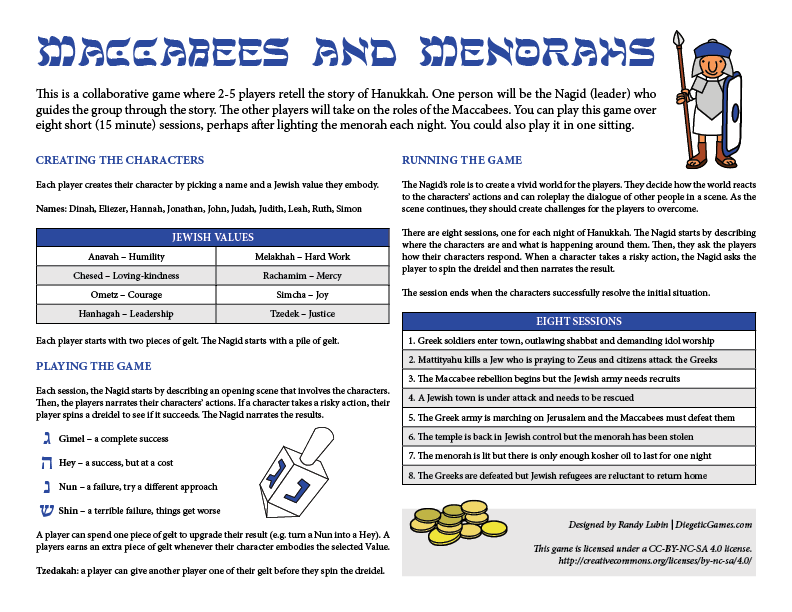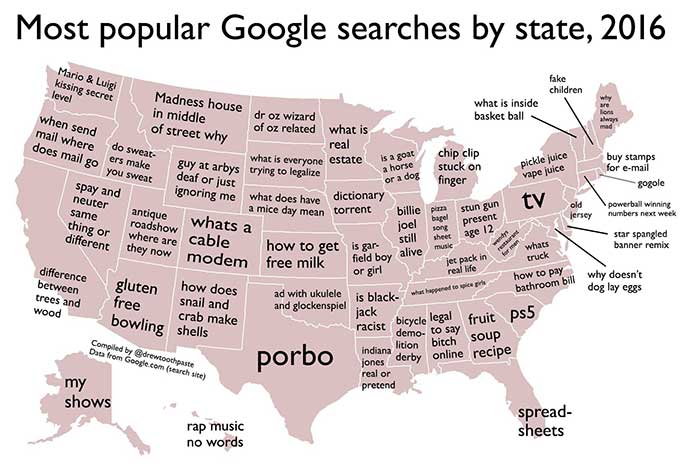
Randy sez, “Maccabees and Menorahs is a one page RPG played with a dreidel and gelt. Designed to run over 8 short sessions, one for each night of Hanukkah.”
(more…)

Randy sez, “Maccabees and Menorahs is a one page RPG played with a dreidel and gelt. Designed to run over 8 short sessions, one for each night of Hanukkah.”
(more…)

Drew Toothpaste tweeted: “Thank you to Google for helping me compile the most popular search queries for each state in the US this year!”
Finally, some real news for a change.
from Boing Boing
When you’re relaxing at home, there’s nothing quite like an Irish coffee to get your day started. Here’s how the recently-awarded best bar in the world makes theirs.
The Dead Rabbit in New York City recently won the “World’s Best Bar” award from Drinks International, and have won “Best Bar In North America” for four years straight, so they know a thing or two about mixing up good drinks. In this video from the Travel + Leisure YouTube channel, Jillian Vose, the beverage director and bar manager of The Dead Rabbit, shows you how to mix up the best Irish coffee of your life.
Start by filling a six-ounce glass with an ounce and a 1/4 of blended Irish whiskey. Next—and this is key—blend some sugar with your hot coffee before you pour it into your glass with the whiskey in it. Then whip some cold, unsweetened cream (30% to 35% fat content) with a protein shaker bottle, and use it to top off your coffee. Now kick back and enjoy.
The Perfect Cocktail: The Dead Rabbit’s Irish Coffee | YouTube
from Lifehacker


The Encrypted Page Maker lets you paste in a HTML document, pick a password, and then hosts the resulting page at its own site. Simple public publishing, with the source code available in the page source.
The contents of you page is compressed using LZString.js and optionally encrypted using mjsCrypt.js, and stored in the hash of a loader URL. The page loader reads the contents of the URL hash and decrypts and expands the page, setting the value of body.outerHTML. Scripts will work as they are compiled and executed after the page is loaded. Cookies and localStorage will not work between pages as they are both wiped clean when the page loads.
The encryption is unproven, and may only act as a deterent. This page and the loading pages are served over HTTP without SSL so do not trust it with actual confidential infomation. This is a toy. I hope you can have fun with it. All source code is freely avaliable in the page source.
I hope you like long URLs! The author has some other cool toys at their homepage — Ascii to Icon is great.
from Boing Boing
submitted by Edward

Ready for anything the rough-and-tumble life of a graduate student might throw at me!
from Everyday Carry
Publier un jeu de cartes dans une revue a deux principaux inconvénients – ce n’est jamais extrêmement bien payé et les cartes ne sont pas imprimées comme de vraies cartes à jouer – mais, quand il s’agit d’une revue de bandes dessinées, cela a en revanche un avantage extraordinaire, c’est que l’on peut être sûr de la qualité et de l’originalité des illustrations.
Mythos, qui paraît dans le numéro 200 de la revue Lanfeust Mag, voit s’affronter les divinités de quelques grandes mythologies, et l’équipe de Lanfeust n’a pas fait les choses à moitié, faisant appel à des artistes différents pour illustrer chacun des panthéons. Steven Lejeune a dessiné les dieux de la Grèce antique, Joël Jurion et Audrey Mitsuko ceux de l’Inde, Philippe Fenech et Kmixe ceux de l’Égypte ancienne, Sébastien Calveau ceux des vikings, Joël Liochon ceux des aztèques, et enfin Dianiela Dimat quelques uns des innombrables dieux du Japon. Je ne dirai pas quelle série est ma préférée pour ne pas faire de jaloux. Le résultat est splendide à la fois de variété et de cohérence, et je me prends à rêver d’une belle édition avec de jolies cartes – peut-être en anglais, qui sait, si j’arrive un jour à convaincre un éditeur.
Mythos n’est qu’à moitié une nouveauté, et c’est même peut-être le tout premier jeu de cartes dont j’ai eu l’idée. Ce n’est guère plus qu’une bataille, à deux joueurs, dans laquelle j’ai cherché à introduire un zeste de tactique et de psychologie.
Chacun des six plis d’une manche se joue en deux temps, les deux adversaires jouant une deuxième carte après que la première a été révélée, et la force de chaque joueur étant égale la somme des puissances deux cartes. Si votre première carte est bien plus forte que celle de votre adversaire, il n’est sans doute pas nécessaire d’en jouer une deuxième aussi forte, votre adversaire devant logiquement renoncer à remporter le pli pour économiser ses forces – à moins, bien sûr, qu’il ne fasse le même raisonnement, pense que vous allez jouer petit pour conserver vos meilleures cartes et en profite pour mener une contre-attaque fulgurante. En outre, les cartes rapportant plus ou moins de points de victoire, certains plis peuvent être plus intéressants que d’autres. Bien sûr, certaines cartes – pas trop, deux ou trois par joueur – ont des effets spéciaux qu’il faut aussi prendre en compte.
Le thème mythologique s’est rapidement imposé. Il permet en effet de construire des sets de douze cartes bien différents, à peu près équilibrés, avec des effets assez thématiques, basés sur les parèdres ou les attributs divins. Avec six mythologies, il y a quinze duels possibles, ce qui donne au jeu une grande variété.
Une première version de Mythos, parue en 1999 dans la revue Sciences et Vie Découvertes sous le nom de Combat des Dieux, ne comprenait que quatre mythologies, grecque, égyptienne, viking et aztèque. En 2011, pour la revue japonais Gamelink, j’ai ajouté les dieux hindous, tandis que Hayato Kisaragi et Nobuaki Takerube imaginaient un set japonais. Pour la troisième et très belle version qui paraît en 2016 dans Lanfeust Magazine, je me suis contenté de retravailler un peu les équilibres du jeu et d’ajouter quelques effets de cartes ici et là.
There are a few drawbacks to publishing a card in a magazine. The first is that it’s usually not very well paid, and the second is that cards are not printed on professional cardstock. On the other hand, when it’s a comics magazine, it has a major edge, one can be sure the graphics will be gorgeous.
Mythos is published in the 200nd issue of the French comics magazine Lanfeust mag. It’s a game about warring Gods, and the Lanfeust team did not do things by halves, hiring different artists to illustrate the different pantheons. Steven Lejeune drew the ancient Greek gods, Joël Jurion and Audrey Mitsuko the Hindu ones, Philippe Fenech and Kmixe the Egyptian ones, Sébastien Calveau the Viking ones, Joël Liochon the Aztec ones, and Daniela Dimat some of the countless Japanese gods. I won’t telle which set is my favorite. The result is gorgeous, both varied and consistent, and I hope someday there will be an edition with true game cards, may be by some US publisher – email me if interested.
Mythos is not really new, and is based on what might have been my very first card game idea. It’s the game of War, for two players, with some tactics and psychology added.
Every round is made of six tricks, and each trick is played in two steps. Players play a first card, reveal it, then play a second one, and the total strength of a player is the sum of his two cards’ values. So, if your first card is much higher than your opponent’s one, you might think you don’t need to play another strong one, since your opponent will probably give up this trick and save his strength – unless, of course, he makes the same reasoning, thinks that you will keep your best cards for later, and plans a swift counter-attack. Furthermore, some cards, usually low ones, score more points than other when winning tricks, and each player has two or three cards with challenging special effects.
The mythological setting was obvious from the beginning. It allows for different and more or less balanced sets of twelve cards each, some of which have thematic effects based one gods’ attributes. Six mythologies make for fifteen possible duels, which makes the game really varied.
The first version of this game, published in 1999 in the French magazine Sciences & Vie Découvertes, had only four different mythologies, Greek, Egyptian, Aztec and Viking. In 2011, for the Japanese magazine Gamelink, I added a Hindu set, while Hayato Kisaragi and Nobuaki Takerube designed a Japanese one. For this third version, I mostly fine-tuned the balance and added a few new and fun card effects.
from Bruno Faidutti